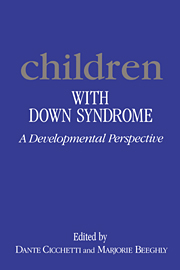Book contents
- Frontmatter
- Contents
- List of contributors
- Preface
- 1 Applying the developmental perspective to individuals with Down syndrome
- 2 An organizational approach to the study of Down syndrome: contributions to an integrative theory of development
- 3 Temperament and Down syndrome
- 4 Interactions between parents and their infants with Down syndrome
- 5 Attention, memory, and perception in infants with Down syndrome: a review and commentary
- 6 Sensorimotor development of infants with Down syndrome
- 7 The growth of self-monitoring among young children with Down syndrome
- 8 Early conceptual development of children with Down syndrome
- 9 Language abilities in children with Down syndrome: evidence for a specific syntactic delay
- 10 Beyond sensorimotor functioning: early communicative and play development of children with Down syndrome
- 11 Peer relations of children with Down syndrome
- 12 Families of children with Down syndrome: ecological contexts and characteristics
- 13 Early intervention from a developmental perspective
- Name index
- Subject index
13 - Early intervention from a developmental perspective
Published online by Cambridge University Press: 02 November 2009
- Frontmatter
- Contents
- List of contributors
- Preface
- 1 Applying the developmental perspective to individuals with Down syndrome
- 2 An organizational approach to the study of Down syndrome: contributions to an integrative theory of development
- 3 Temperament and Down syndrome
- 4 Interactions between parents and their infants with Down syndrome
- 5 Attention, memory, and perception in infants with Down syndrome: a review and commentary
- 6 Sensorimotor development of infants with Down syndrome
- 7 The growth of self-monitoring among young children with Down syndrome
- 8 Early conceptual development of children with Down syndrome
- 9 Language abilities in children with Down syndrome: evidence for a specific syntactic delay
- 10 Beyond sensorimotor functioning: early communicative and play development of children with Down syndrome
- 11 Peer relations of children with Down syndrome
- 12 Families of children with Down syndrome: ecological contexts and characteristics
- 13 Early intervention from a developmental perspective
- Name index
- Subject index
Summary
Introduction
Strictly speaking, the notion of a developmental perspective in the field of mental retardation applies to the developmental–difference controversy associated with Zigler (Zigler & Balla, 1982). Its major emphasis is on understanding the development of nonorganically impaired individuals with mental retardation. Cicchetti & Pogge-Hesse (1982) have adopted a more “liberal” developmental perspective to explicate the early development of infants and preschoolers with Down syndrome. Rather than summarize their excellent reviews of the issues in this area, this chapter will draw upon their work to provide the definitional framework for approaching the topic of intervention strategies for individuals with Down syndrome from a developmental perspective.
After a summary of some of the definitional issues, a brief history of early intervention programs will be presented. This history will show that social, political, and child development research factors influenced the emergence and proliferation of early intervention programs for infants and preschoolers with Down syndrome. A review of early intervention programs for infants and preschoolers with Down syndrome will follow and will include discussion of basic developmental research findings on Down syndrome that have influenced the design of these programs (or might be considered more seriously in the future). The links between the goals of early intervention programs and the goals for the later development of children with Down syndrome are summarized in the conclusion.
For purposes of this chapter, a developmental perspective toward intervention refers to an approach toward programming decisions based on developmental theory and research. Every intervention program must adopt a set of working assumptions to make decisions about the “who, what, why, when, where, and how” of the program's objectives and its strategies to accomplish them.
- Type
- Chapter
- Information
- Children with Down SyndromeA Developmental Perspective, pp. 424 - 448Publisher: Cambridge University PressPrint publication year: 1990
- 2
- Cited by



